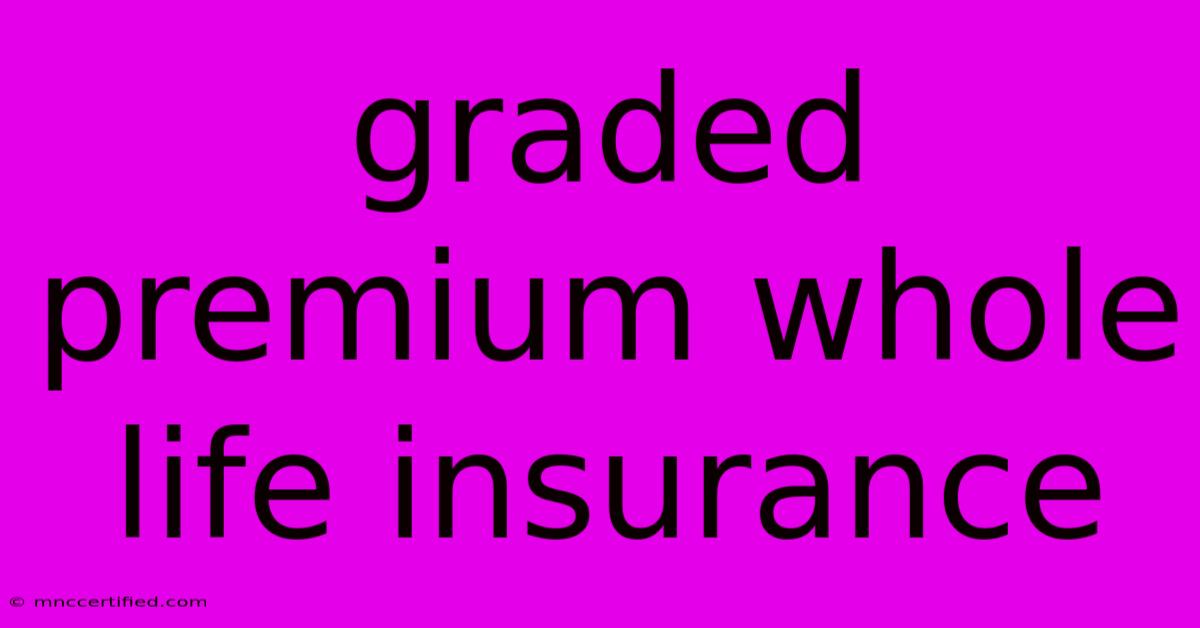Graded Premium Whole Life Insurance

Table of Contents
Graded Premium Whole Life Insurance: A Deeper Dive
Whole life insurance offers lifelong coverage and cash value accumulation, but traditional policies can be expensive. Graded premium whole life insurance presents an attractive alternative, offering lower initial premiums that gradually increase over time. This article explores the ins and outs of graded premium whole life insurance, its pros and cons, and helps you decide if it's the right fit for your needs.
Understanding Graded Premium Whole Life Insurance
Graded premium whole life insurance, also known as graded death benefit whole life insurance, is a type of permanent life insurance characterized by its unique premium structure. Here's how it works:
- Lower Initial Premiums: You pay a lower premium in the initial years compared to a traditional whole life policy.
- Gradual Premium Increases: The premium gradually increases each year for a specified period, usually 5 to 10 years, until it reaches a fixed level.
- Fixed Premium After the Graded Period: Once the graded period ends, the premium remains fixed for the rest of your life.
Advantages of Graded Premium Whole Life Insurance
1. Affordable Entry Point: The lower initial premiums make this type of insurance more accessible to those with budget constraints.
2. Guaranteed Lifetime Coverage: Provides lifelong protection, ensuring your beneficiaries receive a death benefit upon your passing.
3. Cash Value Accumulation: Like traditional whole life insurance, it offers cash value that grows over time, which can be borrowed against or withdrawn.
4. Potential for Tax Advantages: The cash value growth and death benefit are generally tax-deferred, providing potential tax benefits.
Disadvantages of Graded Premium Whole Life Insurance
1. Increasing Premiums: While the initial premiums are lower, they gradually increase, potentially becoming a burden later on.
2. Lower Death Benefit in Early Years: The death benefit in the early years is typically lower than a traditional whole life policy due to the lower premiums.
3. Potential for Higher Overall Costs: Despite the lower initial premiums, the overall cost over the life of the policy can be higher than traditional whole life insurance due to the increasing premiums.
Is Graded Premium Whole Life Insurance Right for You?
Graded premium whole life insurance can be a good option for:
- Younger Individuals: Those starting out with limited financial resources can benefit from the lower initial premiums.
- Budget-Conscious Consumers: If affordability is a primary concern, the initial savings can be appealing.
- Long-Term Coverage Needs: It provides lifelong protection for your loved ones.
However, it's crucial to consider the following:
- Financial Stability: Ensure you can afford the increasing premiums as they rise over time.
- Alternative Options: Compare graded premium policies with traditional whole life and term life insurance to assess the best fit for your needs.
Choosing a Graded Premium Whole Life Insurance Policy
When selecting a graded premium whole life insurance policy, consider these factors:
- Premium Increases: Understand the specific rate of premium increases and the duration of the graded period.
- Death Benefit: Compare the death benefit offered in the initial years with traditional whole life policies.
- Cash Value Growth: Evaluate the potential for cash value accumulation and the interest rates offered.
- Company Reputation: Choose a reputable and financially sound insurance company.
Conclusion
Graded premium whole life insurance presents a unique blend of affordability and lifelong coverage. While it offers lower initial premiums, the gradual increases need careful consideration. By understanding the advantages and disadvantages and comparing it to alternative options, you can make an informed decision about whether this type of insurance meets your specific needs and financial goals.
Keywords: Graded premium whole life insurance, graded death benefit, whole life insurance, permanent life insurance, lower premiums, increasing premiums, death benefit, cash value, financial planning, insurance options, insurance comparison, life insurance, financial stability, affordable insurance, lifelong coverage.

Thank you for visiting our website wich cover about Graded Premium Whole Life Insurance. We hope the information provided has been useful to you. Feel free to contact us if you have any questions or need further assistance. See you next time and dont miss to bookmark.
Featured Posts
-
Dogecoin Outperforms Bitcoin Market Trends
Nov 13, 2024
-
Supermoon In November What And When To Watch
Nov 13, 2024
-
Do Convertibles Cost More To Insure
Nov 13, 2024
-
Law Enforcement Liability Insurance
Nov 13, 2024
-
Costco Butter Recall Latest Updates And Information
Nov 13, 2024